新视野大学英语1课后翻译
新视野大学英语读写教程1课后题答案及各个题目翻译
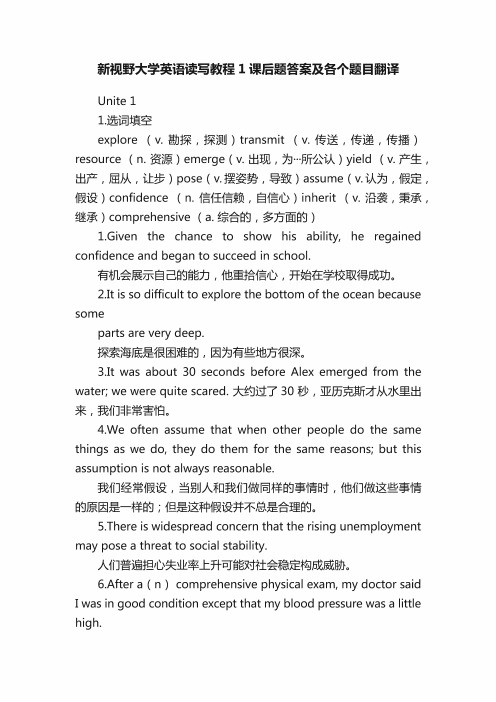
新视野大学英语读写教程1课后题答案及各个题目翻译Unite11.选词填空explore(v.勘探,探测)transmit(v.传送,传递,传播)resource(n.资源)emerge(v.出现,为…所公认)yield(v.产生,出产,屈从,让步)pose(v.摆姿势,导致)assume(v.认为,假定,假设)confidence(n.信任信赖,自信心)inherit(v.沿袭,秉承,继承)comprehensive(a.综合的,多方面的)l.Given the chance to show his ability,he regained confidence and began to succeed in school.有机会展示自己的能力,他重拾信心,开始在学校取得成功。
2.1t is so difficult to explore the bottom of the ocean because someparts are very deep.探索海底是很困难的,因为有些地方很深。
3.It was about30seconds before Alex emerged from the water;we were quite scared.大约过了30秒,亚历克斯才从水里出来,我们非常害怕。
4.W e often assume that when other people do the same things as we do z they do them for the same reasons;but this assumption is not always reasonable.我们经常假设,当别人和我们做同样的事情时,他们做这些事情的原因是一样的;但是这种假设并不总是合理的。
5.T here is widespread concern that the rising unemployment may pose a threat to social stability.人们普遍担心失业率上升可能对社会稳定构成威胁。
新视野大学英语读写教程(一)unit1听力原文和翻译
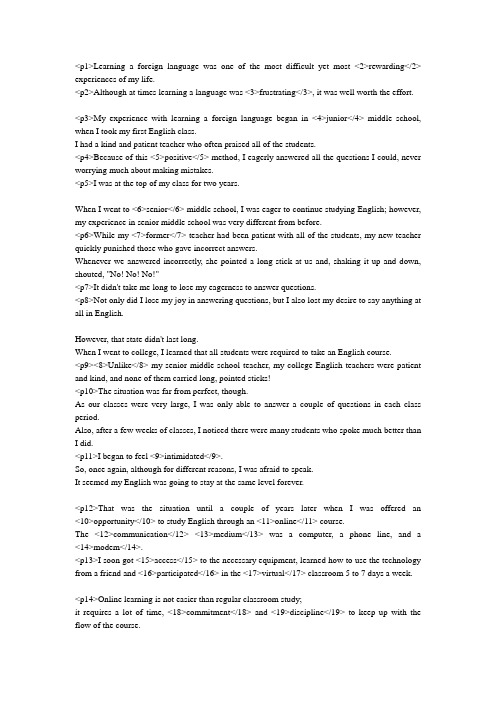
<p1>Learning a foreign language was one of the most difficult yet most <2>rewarding</2> experiences of my life.<p2>Although at times learning a language was <3>frustrating</3>, it was well worth the effort.<p3>My experience with learning a foreign language began in <4>junior</4> middle school, when I took my first English class.I had a kind and patient teacher who often praised all of the students.<p4>Because of this <5>positive</5> method, I eagerly answered all the questions I could, never worrying much about making mistakes.<p5>I was at the top of my class for two years.When I went to <6>senior</6> middle school, I was eager to continue studying English; however, my experience in senior middle school was very different from before.<p6>While my <7>former</7> teacher had been patient with all of the students, my new teacher quickly punished those who gave incorrect answers.Whenever we answered incorrectly, she pointed a long stick at us and, shaking it up and down, shouted, "No! No! No!"<p7>It didn't take me long to lose my eagerness to answer questions.<p8>Not only did I lose my joy in answering questions, but I also lost my desire to say anything at all in English.However, that state didn't last long.When I went to college, I learned that all students were required to take an English course.<p9><8>Unlike</8> my senior middle school teacher, my college English teachers were patient and kind, and none of them carried long, pointed sticks!<p10>The situation was far from perfect, though.As our classes were very large, I was only able to answer a couple of questions in each class period.Also, after a few weeks of classes, I noticed there were many students who spoke much better than I did.<p11>I began to feel <9>intimidated</9>.So, once again, although for different reasons, I was afraid to speak.It seemed my English was going to stay at the same level forever.<p12>That was the situation until a couple of years later when I was offered an <10>opportunity</10> to study English through an <11>online</11> course.The <12>communication</12> <13>medium</13> was a computer, a phone line, and a <14>modem</14>.<p13>I soon got <15>access</15> to the necessary equipment, learned how to use the technology from a friend and <16>participated</16> in the <17>virtual</17> classroom 5 to 7 days a week.<p14>Online learning is not easier than regular classroom study;it requires a lot of time, <18>commitment</18> and <19>discipline</19> to keep up with the flow of the course.<p15>I worked hard to meet the <20>minimum</20> standards set by the course and to complete <21>assignments</21> on time.I practiced all the time.I carried a little dictionary with me everywhere I went, as well as a notebook in which I listed any new words I heard.<p16>I made many, sometimes <23>embarrassing</23>, mistakes.<p17>Once in a while I cried out of <24>frustration</24>, and sometimes I felt like giving up.<p18>But I didn't feel intimidated by students who spoke faster than I did because I took all the time I needed to think out my ideas and wrote a reply before <25>posting</25> it on the screen. <p19>Then, one day I realized I could understand just about everything I came across, and most importantly, I could "say" anything I wanted to in English.<p20>Although I was still making many mistakes and was <27>continually</27> learning new ways to say things, I had finally <28>reaped</28> the <29>benefits</29> of all of my hard work.<p21>Learning a foreign language has been a most trying experience for me, but one that I wouldn't trade for anything.<p22>Not only did learning another language teach me the value of hard work, but it also gave me <30>insights</30> into another culture, and my mind was opened to new ways of seeing things. The most wonderful result of having learned a foreign language was that I could <31>communicate</31> with many more people than before.Talking with people is one of my <32>favorite</32> activities, so being able to speak a new language lets me meet new people, participate in conversations, and form new, unforgettable friendships.<p23>Now that I speak a foreign language, instead of staring into space when English is being spoken,I can participate and make friends.<p24>I am able to reach out to others and bridge the <33>gap</33> between my language and culture and theirs.学习外语是我一生中最艰苦也是最有意义的经历之一。
新视野大学英语第二版Unit1-7原文+课后翻译
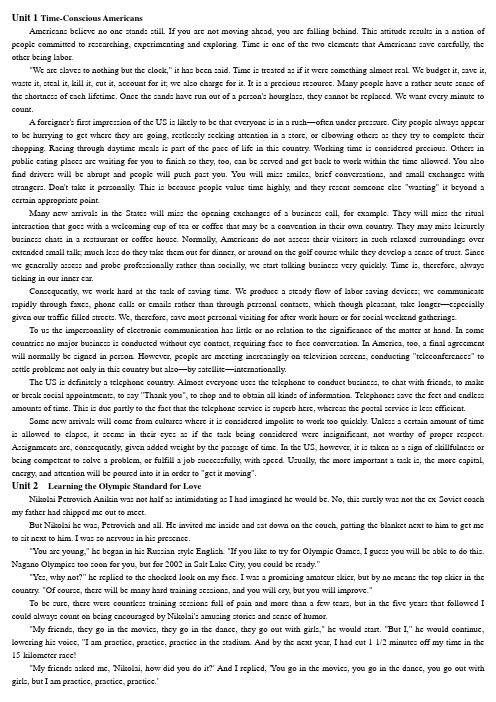
Unit 1 Time-Conscious AmericansAmericans believe no one stands still. If you are not moving ahead, you are falling behind. This attitude results in a nation of people committed to researching, experimenting and exploring. Time is one of the two elements that Americans save carefully, the other being labor."We are slaves to nothing but the clock," it has been said. Time is treated as if it were something almost real. We budget it, save it, waste it, steal it, kill it, cut it, account for it; we also charge for it. It is a precious resource. Many people have a rather acute sense of the shortness of each lifetime. Once the sands have run out of a person's hourglass, they cannot be replaced. We want every minute to count.A foreigner's first impression of the US is likely to be that everyone is in a rush—often under pressure. City people always appear to be hurrying to get where they are going, restlessly seeking attention in a store, or elbowing others as they try to complete their shopping. Racing through daytime meals is part of the pace of life in this country. Working time is considered precious. Others in public eating-places are waiting for you to finish so they, too, can be served and get back to work within the time allowed. You also find drivers will be abrupt and people will push past you. You will miss smiles, brief conversations, and small exchanges with strangers. Don't take it personally. This is because people value time highly, and they resent someone else "wasting" it beyond a certain appropriate point.Many new arrivals in the States will miss the opening exchanges of a business call, for example. They will miss the ritual interaction that goes with a welcoming cup of tea or coffee that may be a convention in their own country. They may miss leisurely business chats in a restaurant or coffee house. Normally, Americans do not assess their visitors in such relaxed surroundings over extended small talk; much less do they take them out for dinner, or around on the golf course while they develop a sense of trust. Since we generally assess and probe professionally rather than socially, we start talking business very quickly. Time is, therefore, always ticking in our inner ear.Consequently, we work hard at the task of saving time. We produce a steady flow of labor-saving devices; we communicate rapidly through faxes, phone calls or emails rather than through personal contacts, which though pleasant, take longer—especially given our traffic-filled streets. We, therefore, save most personal visiting for after-work hours or for social weekend gatherings.To us the impersonality of electronic communication has little or no relation to the significance of the matter at hand. In some countries no major business is conducted without eye contact, requiring face-to-face conversation. In America, too, a final agreement will normally be signed in person. However, people are meeting increasingly on television screens, conducting "teleconferences" to settle problems not only in this country but also—by satellite—internationally.The US is definitely a telephone country. Almost everyone uses the telephone to conduct business, to chat with friends, to make or break social appointments, to say "Thank you", to shop and to obtain all kinds of information. Telephones save the feet and endless amounts of time. This is due partly to the fact that the telephone service is superb here, whereas the postal service is less efficient.Some new arrivals will come from cultures where it is considered impolite to work too quickly. Unless a certain amount of time is allowed to elapse, it seems in their eyes as if the task being considered were insignificant, not worthy of proper respect. Assignments are, consequently, given added weight by the passage of time. In the US, however, it is taken as a sign of skillfulness or being competent to solve a problem, or fulfill a job successfully, with speed. Usually, the more important a task is, the more capital, energy, and attention will be poured into it in order to "get it moving".Unit 2 Learning the Olympic Standard for LoveNikolai Petrovich Anikin was not half as intimidating as I had imagined he would be. No, this surely was not the ex-Soviet coach my father had shipped me out to meet.But Nikolai he was, Petrovich and all. He invited me inside and sat down on the couch, patting the blanket next to him to get me to sit next to him. I was so nervous in his presence."You are young," he began in his Russian-style English. "If you like to try for Olympic Games, I guess you will be able to do this. Nagano Olympics too soon for you, but for 2002 in Salt Lake City, you could be ready.""Yes, why not?" he replied to the shocked look on my face. I was a promising amateur skier, but by no means the top skier in the country. "Of course, there will be many hard training sessions, and you will cry, but you will improve."To be sure, there were countless training sessions full of pain and more than a few tears, but in the five years that followed I could always count on being encouraged by Nikolai's amusing stories and sense of humor."My friends, they go in the movies, they go in the dance, they go out with girls," he would start. "But I," he would continue, lowering his voice, "I am practice, practice, practice in the stadium. And by the next year, I had cut 1-1/2 minutes off my time in the 15-kilometer race!"My friends asked me, 'Nikolai, how did you do it?' And I replied, 'You go in the movies, you go in the dance, you go out with girls, but I am practice, practice, practice.'Here the story usually ended, but on one occasion, which we later learned was his 25th wedding anniversary, he stood proudly in a worn woolen sweater and smiled and whispered, "And I tell you, I am 26 years old before I ever kiss a girl! She was the woman I later marry."Romantic and otherwise, Nikolai knew love. His consistent good humor, quiet gratitude, perceptivity, and sincerity set an Olympic standard for love that I continue to reach for, even though my skiing days are over.Still, he never babied me. One February day I had a massive headache and felt quite fatigued. I came upon him in a clearing, and after approximately 15 minutes of striding into the cold breeze over the white powder to catch him, I fussed, "Oh, Nikolai, I feel like I am going to die.""When you are a hundred years old, everybody dies," he said, indifferent to my pain. "But now," he continued firmly. "Now must be ski, ski, ski."And, on skis, I did what he said. On other matters, though, I was rebellious. Once, he packed 10 of us into a Finnish bachelor's tiny home for a low-budget ski camp. We awoke the first morning to find Nikolai making breakfast and then made quick work with our spoons while sitting on makeshift chairs around a tiny card table. When we were finished, Nikolai stacked the sticky bowls in front of my sole female teammate and me, asserting, "Now, girls do dishes!"I threw my napkin on the floor and swore at him, "Ask the damn boys! This is unfair." He never asked this of me again, nor did he take much notice of my outburst. He saved his passion for skiing.When coaching, he would sing out his instructions keeping rhythm with our stride: "Yes, yes, one-two-three, one-two-three." A dear lady friend of my grandfather, after viewing a copy of a video of me training with Nikolai, asked, "Does he also teach dance?"In training, I worked without rest to correct mistakes that Nikolai pointed out and I asked after each pass if it was better."Yes, it's OK. But the faster knee down, the better.""But is it fast enough?" I'd persist.Finally he would frown and say, "Billion times you make motion—then be perfect," reminding me in an I've-told-you-a-billion-times tone, "You must be patient."Nikolai's patience and my hard work earned me a fourth-place national ranking heading into the pre-Olympic season, but then I missed the cut for the 2002 Olympics.Last summer, I returned to visit Nikolai. He made me tea... and did the dishes! We talked while sitting on his couch. Missing the Olympic Team the previous year had made me pause and reflect on what I had gained—not the least of which was a quiet, indissoluble bond with a short man in a tropical shirt.Nikolai taught me to have the courage, heart, and discipline to persist, even if it takes a billion tries. He taught me to be thankful in advance for a century of life on earth, and to remind myself every day that despite the challenges at hand, "Now must be love, love, love."Unit3Marriage Across the NationsGail and I imagined a quiet wedding. During our two years together we had experienced the usual ups and downs of a couple learning to know, understand, and respect each other. But through it all we had honestly confronted the weaknesses and strengths of each other's characters.Our racial and cultural differences enhanced our relationship and taught us a great deal about tolerance, compromise, and being open with each other. Gail sometimes wondered why I and other blacks were so involved with the racial issue, and I was surprised that she seemed to forget the subtler forms of racial hatred in American society.Gail and I had no illusions about what the future held for us as a married, mixed couple in America. The continual source of our strength was our mutual trust and respect.We wanted to avoid the mistake made by many couples of marrying for the wrong reasons, and only finding out ten, twenty, or thirty years later that they were incompatible, that they hardly took the time to know each other, that they overlooked serious personality conflicts in the expectation that marriage was an automatic way to make everything work out right. That point was emphasized by the fact that Gail's parents, after thirty-five years of marriage, were going through a bitter and painful divorce, which had destroyed Gail and for a time had a negative effect on our budding relationship.When Gail spread the news of our wedding plans to her family she met with some resistance. Her mother, Deborah, all along had been supportive of our relationship, and even joked about when we were going to get married so she could have grandchildren. Instead of congratulations upon hearing our news, Deborah counseled Gail to be really sure she was doing the right thing."So it was all right for me to date him, but it's wrong for me to marry him. Is his color the problem, Mom?" Gail subsequently told me she had asked her mother."To start with I must admit that at first I harbored reservations about a mixed marriage, prejudices you might even call them. But when I met Mark I found him a charming and intelligent young guy. Any mother would be proud to have him for a son-in-law. So,color has nothing to do with it. Yes, my friends talk. Some even express shock at what you're doing. But they live in a different world. So you see, Mark's color is not the problem. My biggest worry is that you may be marrying Mark for the same wrong reasons that I married your father. When we met I saw him as my beloved, intelligent, charming, and caring. It was all so new, all so exciting, and we both thought, on the surface at least, that ours was an ideal marriage with every indication that it would last forever. I realized only later that I didn't know my beloved, your father, very well when we married.""But Mark and I have been together more than two years," Gail railed. "We've been through so much together. We've seen each other at our worst many times. I'm sure that time will only confirm what we feel deeply about each other.""You may be right. But I still think that waiting won't hurt. You're only twenty-five."Gail's father, David, whom I had not yet met personally, approached our decision with a father-knows-best attitude. He basically asked the same questions as Gail's mother: "Why the haste? Who is this Mark? What's his citizenship status?" And when he learned of my problems with the Citizenship department, he immediately suspected that I was marrying his daughter in order to remain in the United States."But Dad, that's harsh," Gail said."Then why the rush? Buy time, buy time," he remarked repeatedly."Mark has had problems with citizenship before and has always taken care of them himself," Gail defended." In fact, he made it very clear when we were discussing marriage that if I had any doubts about anything, I should not hesitate to cancel our plans."Her father proceeded to quote statistics showing that mixed couples had higher divorce rates than couples of the same race and gave examples of mixed couples he had counseled who were having marital difficulties."Have you thought about the hardships your children would go through?" he asked."Dad, are you a racist?""No, of course not. But you have to be realistic.""Maybe our children will have some problems, but whose children don't? But one thing they'll always have: our love and devotion.""That's idealistic. People can be very cruel toward children from mixed marriages.""Dad, we'll worry about that when the time comes. If we had to resolve all doubt before we acted, very little would ever get done.""Remember, it's never too late to change your mind."Unit 4 A Test of True LoveSix minutes to six, said the digital clock over the information desk in Grand Central Station. John Blandford, a tall young army officer, focused his eyesight on the clock to note the exact time. In six minutes he would see the woman who had filled a special place in his life for the past thirteen months, a woman he had never seen, yet whose written words had been with him and had given him strength without fail.Soon after he volunteered for military service, he had received a book from this woman. A letter, which wished him courage and safety, came with the book. He discovered that many of his friends, also in the army, had received the identical book from the woman, Hollis Meynell. And while they all got strength from it, and appreciated her support of their cause, John Blandford was the only person to write Ms. Meynell back. On the day of his departure, to a destination overseas where he would fight in the war, he received her reply. Aboard the cargo ship that was taking him into enemy territory, he stood on the deck and read her letter to him again and again.For thirteen months, she had faithfully written to him. When his letters did not arrive, she wrote anyway, without decrease. During the difficult days of war, her letters nourished him and gave him courage. As long as he received letters from her, he felt as though he could survive. After a short time, he believed he loved her, and she loved him. It was as if fate had brought them together.But when he asked her for a photo, she declined his request. She explained her objection: "If your feelings for me have any reality, any honest basis, what I look like won't matter. Suppose I'm beautiful. I'd always be bothered by the feeling that you loved me for my beauty, and that kind of love would disgust me. Suppose I'm plain. Then I'd always fear you were writing to me only because you were lonely and had no one else. Either way, I would forbid myself from loving you. When you come to New York and you see me, then you can make your decision. Remember, both of us are free to stop or to go on after that—if that's what we choose..."One minute to six... Blandford's heart leaped.A young woman was coming toward him, and he felt a connection with her right away. Her figure was long and thin, her spectacular golden hair lay back in curls from her small ears. Her eyes were blue flowers; her lips had a gentle firmness. In her fancy green suit she was like springtime come alive.He started toward her, entirely forgetting to notice that she wasn't wearing a rose, and as he moved, a small, warm smile formed on her lips."Going my way, soldier?" she asked.Uncontrollably, he made one step closer to her. Then he saw Hollis Meynell.She was standing almost directly behind the girl, a woman well past forty, and a fossil to his young eyes, her hair sporting patches of gray. She was more than fat; her thick legs shook as they moved. But she wore a red rose on her brown coat.The girl in the green suit was walking quickly away and soon vanished into the fog. Blandford felt as though his heart was being compressed into a small cement ball, so strong was his desire to follow the girl, yet so deep was his longing for the woman whose spirit had truly companioned and brought warmth to his own; and there she stood. Her pale, fat face was gentle and intelligent; he could see that now. Her gray eyes had a warm, kindly look.Blandford resisted the urge to follow the younger woman, though it was not easy to do so. His fingers held the book she had sent to him before he went off to the war, which was to identify him to Hollis Meynell. This would not be love. However, it would be something precious, something perhaps even less common than love—a friendship for which he had been, and would always be, thankful.He held the book out toward the woman."I'm John Blandford, and you—you are Ms. Meynell. I'm so glad you could meet me. May I take you to dinner?" The woman smiled. "I don't know what this is all about, son," she answered. "That young lady in the green suit—the one who just went by—begged me to wear this rose on my coat. And she said that if you asked me to go out with you, I should tell you that she's waiting for you in that big restaurant near the highway. She said it was some kind of a test."Unit5 Weeping for My Smoking DaughterMy daughter smokes. While she is doing her homework, her feet on the bench in front of her and her calculator clicking out answ ers to her geometry problems, I am looking at the half-empty package of Camels tossed carelessly close at hand. I pick them up, take t hem into the kitchen, where the light is better, and study them -- they are filtered, for which I am grateful. My heart feels terrible. I wa nt to weep. In fact, I do weep a little, standing there by the stove holding one of the instruments, so white, so precisely rolled, that coul d cause my daughter's death. When she smoked Marlboros and Players I hardened myself against feeling so bad; nobody I knew ever s moked these brands.She doesn't know this, but it was Camels that my father, her grandfather, smoked. But before he smoked cigarettes made by manu facturers -- when he was very young and very poor, with glowing eyes -- he smoked Prince Albert tobacco in cigarettes he rolled hims elf. I remember the bright-red tobacco tin, with a picture of Queen Victoria's partner, Prince Albert, dressed in a black dress coat and c arrying a cane .By the late forties and early fifties no one rolled his own anymore (and few women smoked) in my hometown of Eatonton, Georg ia. The tobacco industry, coupled with Hollywood movies in which both male and female heroes smoked like chimneys, completely w on over people like my father, who were hopelessly hooked by cigarettes. He never looked as fashionable as Prince Albert, though; he continued to look like a poor, overweight, hard working colored man with too large a family, black, with a very white cigarette stuck i n his mouth.I do not remember when he started to cough. Perhaps it was unnoticeable at first, a little coughing in the morning as he lit his first cigarette upon getting out of bed. By the time I was sixteen, my daughter's age, his breath was a wheeze, embarrassing to hear; he cou ld not climb stairs without resting every third or fourth step. It was not unusual for him to cough for an hour.My father died from "the poor man's friend", pneumonia, one hard winter when his lung illnesses had left him low. I doubt he had much lung left at all, after coughing for so many years. He had so little breath that, during his last years, he was always leaning on som ething. I remembered once, at a family reunion, when my daughter was two, that my father picked her up for a minute -- long enough for me to photograph them -- but the effort was obvious. Near the very end of his life, and largely because he had no more lungs, he qu it smoking. He gained a couple of pounds, but by then he was so slim that no one noticed.When I travel to Third World countries I see many people like my father and daughter. There are large advertisement signs directe d at them both: the tough, confident or fashionable older man, the beautiful, "worldly" young woman, both dragging away. In these po or countries, as in American inner cities and on reservations, money that should be spent for food goes instead to the tobacco compani es; over time, people starve themselves of both food and air, effectively weakening and hooking their children, eventually killing them selves. I read in the newspaper and in my gardening magazine that the ends of cigarettes are so poisonous that if a baby swallows one, it is likely to die, and that the boiled water from a bunch of them makes an effective insecticide.There is a deep hurt that I feel as a mother. Some days it is a feeling of uselessness. I remember how carefully I ate when I was pr egnant, how patiently I taught my daughter how to cross a street safely. For what, I sometimes wonder; so that she can struggle to brea the through most of her life feeling half her strength, and then die of self-poisoning, as her grandfather did?There is a quotation from a battered women's shelter that I especially like: "Peace on earth begins at home." I believe everything d oes. I think of a quotation for people trying to stop smoking: "Every home is a no smoking zone." Smoking is a form of self-battering that also batters those who must sit by, occasionally joke or complain, and helplessly watch. I realize now that as a child I sat by, throu gh the years, and literally watched my father kill himself: surely one such victory in my family, for the prosperous leaders who own th e tobacco companies, is enoughUnit 6 As His Name Is, So Is He!For her first twenty-four years, she'd been known as Debbie—a name that didn't suit her good looks and elegant manner. "My name has always made me think I should be a cook," she complained. "I just don't feel like a Debbie."One day, while filling out an application form for a publishing job, the young woman impulsively substituted her middle name, Lynne, for her first name Debbie. "That was the smartest thing I ever did," she says now. "As soon as I stopped calling myself Debbie, I felt more comfortable with myself... and other people started to take me more seriously." Two years after her successful job interview, the former waitress is now a successful magazine editor. Friends and associates call her Lynne.Naturally, the name change didn't cause Debbie/Lynne's professional achievement—but it surely helped if only by adding a bit of self-confidence to her talents. Social scientists say that what you're called can affect your life. Throughout history, names have not merely identified people but also described them. "As his name is, so is he." says the Bible, and Webster's Dictionary includes the following definition of name: "a word or words expressing some quality considered characteristic or descriptive of a person or a thing, often expressing approval or disapproval". Note well "approval or disapproval". For better or worse, qualities such as friendliness or reserve, plainness or charm may be suggested by your name and conveyed to other people before they even meet you.Names become attached to specific images, as anyone who's been called "a plain Jane" or "just an average Joe" can show. The latter name particularly bothers me since my name is Joe, which some think makes me more qualified to be a baseball player than, say, an art critic. Yet, despite this disadvantage, I did manage to become an art critic for a time. Even so, one prominent magazine consistently refused to print "Joe" in my by-line, using my first initials, J. S., instead. I suspect that if I were a more refined Arthur or Adrian, the name would have appeared complete.Of course, names with a positive sense can work for you and even encourage new acquaintances. A recent survey showed that American men thought Susan to be the most attractive female name, while women believed Richard and David were the most attractive for men. One woman I know turned down a blind date with a man named Harry because "he sounded dull". Several evenings later, she came up to me at a party, pressing for an introduction to a very impressive man; they'd been exchanging glances all evening. "Oh," I said. "You mean Harry." She was ill at ease.Though most of us would like to think ourselves free from such prejudiced notions, we're all guilty of name stereotyping to some extent. Confess: Wouldn't you be surprised to meet a carpenter named Nigel? A physicist named Bertha? A Pope Mel? Often, we project name-based stereotypes on people, as one woman friend discovered while taking charge of a nursery school's group of four-year-olds. "There I was, trying to get a little active boy named Julian to sit quietly and read a book—and pushing a thoughtful creature named Rory to play ball. I had their personalities confused because of their names!"Apparently, such prejudices can affect classroom achievement as well. In a study conducted by Herbert Harari of San Diego State University, and John McDavid of Georgia State University, teachers gave consistently lower grades on essays apparently written by boys named Elmer and Hubert than they awarded to the same papers when the writers' names were given as Michael and David. However, teacher prejudice isn't the only source of classroom difference. Dr. Thomas V. Busse and Louisa Seraydarian of Temple University found those girls with names such as Linda, Diane, Barbara, Carol, and Cindy performed better on objectively graded IQ and achievement tests than did girls with less appealing names. (A companion study showed girls' popularity with their peers was also related to the popularity of their names―although the connection was less clear for boys.)Though your parents probably meant your name to last a lifetime, remember that when they picked it they'd hardly met you, and the hopes and dreams they valued when they chose it may not match yours. If your name no longer seems to fit you, don't despair; you aren't stuck with the label. Movie stars regularly change their names, and with some determination, you can, too.Unit 7 Lighten Your Load and Save Your LifeIf you often feel angry and overwhelmed, like the stress in your life is spinning out of control, then you may be hurting your heart.If you don't want to break your own heart, you need to learn to take charge of your life where you can—and recognize there are many things beyond your control.So says Dr. Robert S. Eliot, author of a new book titled From Stress to Strength: How to Lighten Your Load and Save Your Life. He's a clinical professor of medicine at the University of Nebraska.Eliot says there are people in this world that he calls "hot reactors". For these people, being tense may cause tremendous and rapid increases in their blood pressure.Eliot says researchers have found that stressed people have higher cholesterol levels, among other things. "We've done years of work in showing that excess alarm or stress chemicals can literally burst heart muscle fibers. When that happens it happens very。
新视野大学英语读写教程1课文翻译(完全版)
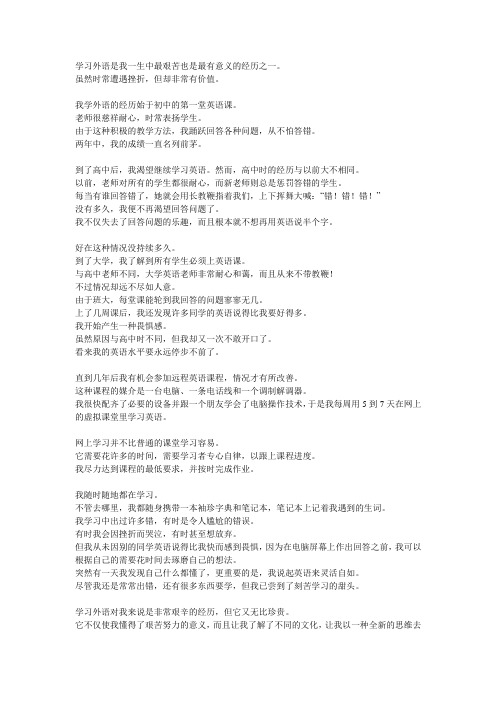
学习外语是我一生中最艰苦也是最有意义的经历之一。
虽然时常遭遇挫折,但却非常有价值。
我学外语的经历始于初中的第一堂英语课。
老师很慈祥耐心,时常表扬学生。
由于这种积极的教学方法,我踊跃回答各种问题,从不怕答错。
两年中,我的成绩一直名列前茅。
到了高中后,我渴望继续学习英语。
然而,高中时的经历与以前大不相同。
以前,老师对所有的学生都很耐心,而新老师则总是惩罚答错的学生。
每当有谁回答错了,她就会用长教鞭指着我们,上下挥舞大喊:“错!错!错!”没有多久,我便不再渴望回答问题了。
我不仅失去了回答问题的乐趣,而且根本就不想再用英语说半个字。
好在这种情况没持续多久。
到了大学,我了解到所有学生必须上英语课。
与高中老师不同,大学英语老师非常耐心和蔼,而且从来不带教鞭!不过情况却远不尽如人意。
由于班大,每堂课能轮到我回答的问题寥寥无几。
上了几周课后,我还发现许多同学的英语说得比我要好得多。
我开始产生一种畏惧感。
虽然原因与高中时不同,但我却又一次不敢开口了。
看来我的英语水平要永远停步不前了。
直到几年后我有机会参加远程英语课程,情况才有所改善。
这种课程的媒介是一台电脑、一条电话线和一个调制解调器。
我很快配齐了必要的设备并跟一个朋友学会了电脑操作技术,于是我每周用5到7天在网上的虚拟课堂里学习英语。
网上学习并不比普通的课堂学习容易。
它需要花许多的时间,需要学习者专心自律,以跟上课程进度。
我尽力达到课程的最低要求,并按时完成作业。
我随时随地都在学习。
不管去哪里,我都随身携带一本袖珍字典和笔记本,笔记本上记着我遇到的生词。
我学习中出过许多错,有时是令人尴尬的错误。
有时我会因挫折而哭泣,有时甚至想放弃。
但我从未因别的同学英语说得比我快而感到畏惧,因为在电脑屏幕上作出回答之前,我可以根据自己的需要花时间去琢磨自己的想法。
突然有一天我发现自己什么都懂了,更重要的是,我说起英语来灵活自如。
尽管我还是常常出错,还有很多东西要学,但我已尝到了刻苦学习的甜头。
第三版新视野大学英语1课后翻译及答案
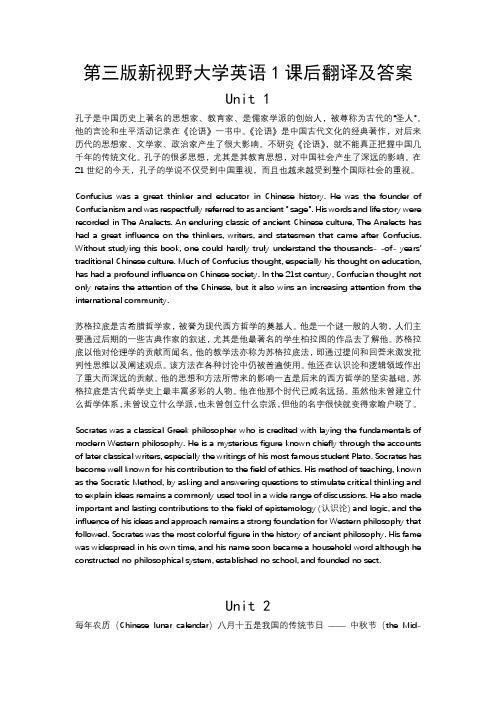
第三版新视野大学英语1课后翻译及答案Unit 1孔子是中国历史上著名的思想家、教育家、是儒家学派的创始人,被尊称为古代的“圣人”。
他的言论和生平活动记录在《论语》一书中。
《论语》是中国古代文化的经典著作,对后来历代的思想家、文学家、政治家产生了很大影响。
不研究《论语》,就不能真正把握中国几千年的传统文化。
孔子的很多思想,尤其是其教育思想,对中国社会产生了深远的影响。
在21世纪的今天,孔子的学说不仅受到中国重视,而且也越来越受到整个国际社会的重视。
Confucius was a great thinker and educator in Chinese history. He was the founder of Confucianism and was respectfully referred to as ancient " sage". His words and life story were recorded in The Analects. An enduring classic of ancient Chinese culture, The Analects has had a great influence on the thinkers, writers, and statesmen that came after Confucius. Without studying this book, one could hardly truly understand the thousands- -of- years' traditional Chinese culture. Much of Confucius thought, especially his thought on education, has had a profound influence on Chinese society. In the 21st century, Confucian thought not only retains the attention of the Chinese, but it also wins an increasing attention from the international community.苏格拉底是古希腊哲学家,被誉为现代西方哲学的奠基人。
第三版新视野大学英语读写教程1 Unit 1 Section A课文翻译

奔向更加光明的未来1 下午好!作为校长,我非常自豪地欢迎你们来到这所大学。
你们所取得的成就是你们自己多年努力的结果,也是你们的父母和老师们多年努力的结果。
在这所大学里,我们承诺将使你们学有所成。
2 在欢迎你们到来的这一刻,我想起自己高中毕业时的情景,还有妈妈为我和爸爸拍的合影。
妈妈吩咐我们:“姿势自然点。
”“等一等,”爸爸说,“把我递给他闹钟的情景拍下来。
”在大学期间,那个闹钟每天早晨叫醒我。
至今它还放在我办公室的桌子上。
3 让我来告诉你们一些你们未必预料得到的事情。
你们将会怀念以前的生活习惯,怀念父母曾经提醒你们要刻苦学习、取得佳绩。
你们可能因为高中生活终于结束而喜极而泣,你们的父母也可能因为终于不用再给你们洗衣服而喜极而泣!但是要记住:未来是建立在过去扎实的基础上的。
4 对你们而言,接下来的四年将会是无与伦比的一段时光。
在这里,你们拥有丰富的资源:有来自全国各地的有趣的学生,有学识渊博又充满爱心的老师,有综合性图书馆,有完备的运动设施,还有针对不同兴趣的学生社团——从文科社团到理科社团、到社区服务等等。
你们将自由地探索、学习新科目。
你们要学着习惯点灯熬油,学着结交充满魅力的人,学着去追求新的爱好。
我想鼓励你们充分利用这一特殊的经历,并用你们的干劲和热情去收获这一机会所带来的丰硕成果。
5 有这么多课程可供选择,你可能会不知所措。
你不可能选修所有的课程,但是要尽可能体验更多的课程!大学里有很多事情可做可学,每件事情都会为你提供不同视角来审视世界。
如果我只能给你们一条选课建议的话,那就是:挑战自己!不要认为你早就了解自己对什么样的领域最感兴趣。
选择一些你从未接触过的领域的课程。
这样,你不仅会变得更加博学,而且更有可能发现一个你未曾想到的、能成就你未来的爱好。
一个绝佳的例子就是时装设计师王薇薇,她最初学的是艺术史。
随着时间的推移,王薇薇把艺术史研究和对时装的热爱结合起来,并将其转化为对设计的热情,从而使她成为全球闻名的设计师。
新视野大学英语第一册翻译
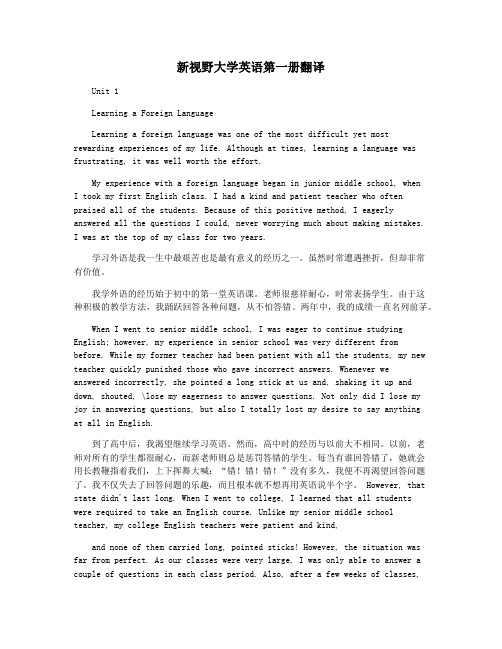
新视野大学英语第一册翻译Unit 1Learning a Foreign LanguageLearning a foreign language was one of the most difficult yet most rewarding experiences of my life. Although at times, learning a language was frustrating, it was well worth the effort.My experience with a foreign language began in junior middle school, whenI took my first English class. I had a kind and patient teacher who often praised all of the students. Because of this positive method, I eagerly answered all the questions I could, never worrying much about making mistakes.I was at the top of my class for two years.学习外语是我一生中最艰苦也是最有意义的经历之一。
虽然时常遭遇挫折,但却非常有价值。
我学外语的经历始于初中的第一堂英语课。
老师很慈祥耐心,时常表扬学生。
由于这种积极的教学方法,我踊跃回答各种问题,从不怕答错。
两年中,我的成绩一直名列前茅。
When I went to senior middle school, I was eager to continue studying English; however, my experience in senior school was very different from before. While my former teacher had been patient with all the students, my new teacher quickly punished those who gave incorrect answers. Whenever we answered incorrectly, she pointed a long stick at us and, shaking it up and down, shouted, \lose my eagerness to answer questions. Not only did I lose my joy in answering questions, but also I totally lost my desire to say anythingat all in English.到了高中后,我渴望继续学习英语。
新视野大学英语第一册课文翻译(N...

新视野大学英语第一册课文翻译(New horizon, College English,Volume 1, text translation)New horizon, College English, Volume 1, text translationUnit 11 learning foreign languages is one of the hardest and most meaningful experiences of my life. Although often encountered setbacks, but it is very valuable.2 my experience of learning a foreign language began with my first English lesson in junior high school. The teacher is very kind and patient and always praises the students. Because of this positive method, I eagerly answered all the questions I could. My grades have been among the best for two years.3 after high school, I was eager to continue learning english. However, high school experiences are quite different from what they used to be. Before the teacher had been patient with all the students, my new teacher quickly punished those who gave incorrect answers. Whenever we answered wrong, she will use a long stick at us, shaking it up and down, shouting: "wrong! Wrong! Wrong!" Before long, I was no longer eager to answer questions. Not only did I lose the pleasure of answering questions, but I didn't even want to say half a word in english.4 fortunately, this situation did not last long. At college,I learned that all students had to take English lessons. Different with high school teachers, College English teachers were patient and kind, and never take the pointer! But thesituation is far from satisfactory. As a result of class, every class has very few questions for me to answer. After a few weeks' lessons, I also found that many of my classmates speak English better than I do. I began to feel a sense of dread. Although the reasons were different from those in high school, I dared not speak again.It seems that my English is going to stop forever.5 it wasn't until several years later that I had the chance to take a distance English course that things improved. The medium for this course is a computer, a telephone line and a modem.I soon got access to the necessary equipment from a friend and how to use computer technology, so I use 5 to 7 days a week to learn English in the virtual classroom.6 online learning is no easier than ordinary classroom learning. It takes a lot of time and requires learners to concentrate on their discipline to keep up with the progress of the course.I try my best to meet the minimum requirements of the course and finish my homework on time.7 I study anywhere and anytime. No matter where I go, I always carry a pocket dictionary and notebook with my new words in my notebook. I've made a lot of mistakes in my studies, and sometimes embarrassing mistakes. Sometimes I cry for frustration, and sometimes I even want to give up. But I have never been afraid of speaking faster than my classmates because I can take time to think about my thoughts on my computer screen. Suddenly one day I found myself understood, and more importantly, I spoke English flexibly. Although I still makemistakes, I still have a lot to learn, but I've already tasted the benefits of hard work.8 learning a foreign language is a very difficult experience for me, but it is also very precious. It not only made me understand the meaning of hard work, but also made me understand different cultures and let me look at things in a completely new way of thinking. The most exciting thing about learning a foreign language is that I can communicate with more people. Talking with people is one of my favorite activities. The new language enables me to get in touch with strangers, participate in their conversations, and build new and unforgettable friendships. Because I can speak English, others speak English when I am no longer quite at a loss. I can get involved and make friends. I am able to communicate with people and bridge the gap between the language I speak and the culture I speak and their language and culture.Unit 21, the radio "click", rock and roll will loudly loudly opened. The music woke Sandy like a gunshot. She looked at the clock. It was a quarter past 6 in the morning. She lay on the bed, listening to her favorite radio, humming words.2 "Sandy," her father shouted, "Sandy, turn off the music."!" Steve Finch rushed into her bedroom. "Why do you have to listen to such bad music?" I heard it again and again. It's rhythmic, but I'm afraid it's not real music."3 "I like this kind of music, dad. This is my favorite. Listen,you'll like it." Sandy stretched out his hand to make the music louder.4 "no, don't make so loud noise, I can't stand it.". Turn down the radio so that your mother and I can't hear you. I'm sure the music hurts both your ears and your brain."5 Sandy walks into the bathroom and opens the shower head. Then she grabbed the soap, washed it all over and over, and even washed her hair.6 after the shower, Sandy combed his hair and put on an old green T-shirt and a pair of jeans. Then she put on makeup and walked into the kitchen. As usual, she didn't know what to eat for breakfast, grabbed a glass of milk and stood by the sink for toast. Just then her mother, Jane, went into the kitchen.7 "Sandy,Why don't you sit down to dinner? Eating standing is bad for your health."8 "I know, mom, but I don't have time to sit down and eat."."9, did you do your homework yesterday, honey?"10 "done!"."11, have you brushed your teeth?"12 "Mum, I haven't finished my dinner yet.". Finish, brushagain."13 "Sandy, why are you wearing that old T-shirt?" Dead ugly."14 "Mom, please don't do that."."15 "what's the matter?""16 "don't bother me so much."."17 "Sandy, how did you trace your Eyeliner?""18 "I did, mom.". I've been tracing it for months. Isn't it beautiful?"19 "Sandy Finch, you're too young to make so much make-up."."20 "Mom, I'm 15 years old, and I'm old enough to make up.". To tell you the truth, all the girls at school makeup, some have tattoos, some still wearing earrings, nose rings, tongue ring. Mom, I don't have time to tell you now. I'm running late. I have to go. Goodbye." Sandy gave her mother a quick peck on the cheek, picked up the book and rushed out of the room.21 after Sandy left home for school, Jan Finch sat down quietly for coffee. After a while, her husband came in.22 "Steve, have some coffee?"" Jane asked.23 "no, thanks, honey.". My stomach uncomfortable, The mind is very confused. It's probably that nasty music that wakes me upevery morning. I don't think I'm old enough to fall out of the way, but it's really annoying me to listen endlessly to the boring, boring song."24 "you know, dear, people of different ages like different music," Jane advised. "Do you remember some of the music we've heard?""25 Steve smiled. "You've got a point there.". Maybe having breakfast would make me feel better."26 "did you notice what makeup our 15 year old daughter made this morning?" I can't believe I didn't notice it before. I think we should feel lucky, because our daughter's biggest problem is just make-up. I saw other young people loafing around the town, tattoos, and holes in it."27 "what worries me is," Steve said. "That kind of music can have a negative effect on Sandy. I don't know what happened to our daughter. She's changing. I'm worried about her. Cosmetics, bad music, who knows what will happen next? We have to talk to her. The news is about teenagers who are in trouble, but their parents don't know what's wrong with their children."28 "Oh, I don't think her music is so bad.". "Anyway, you're right, we need to talk to Sandy," Jane said.29 on the way to work, Jan Finch drove in the car, thinking of her Sandy. She knew what she wanted to say. What did she have to say to Sandy?. She was able to communicate with Sandy, which made her happy. She knew she had to be patient and had to keepthe channels of communication between herself and Sandy open. She wanted to be around Sandy and be her protector, as well as her freedom to find her own self.Unit 31 if I were seen with my father when I was young, I would feel embarrassed. He was badly crippled and short. While we were walking together, his hand was resting on my arm to keep balance, and people would stare. I feel awkward about such an annoying stare. Even when his father noticed or felt uneasy, he never showed it.2 our pace was difficult to reconcile - he often stopped and my steps were impatient. Because of this, we talked very little. But as we started out, he always said: "you set the pace, I follow you."3 we usually go back and forth between the subway door and the front door. That's his route to work. He goes to work when he is ill or in bad weather, hardly ever absent from work. He always arrives at the office on time, even though others can't do it. It's something to be proud of.4 on the road covered with snow and ice, even with help, he can hardly walk. This time, I or my sisters with a child's wagon with steel pull him through the streets of Broolyn to the New York subway station. As soon as he got there, he clung to the handrail of the subway and went down, because the subway was warmer and the steps below were free of ice and snow. The subway station in Manhattan goes through the basement of their officebuilding. He doesn't have to leave the station (to the office). Go home, we will pick him to Broolyn subway station.5 now, in retrospect, I can not help wondering how much courage an adult can bear the humiliation and the pressure of being an adult like him, when he seems to have no pain or complaint.6 he never says he is poor,He never shows his admiration for those who are more fortunate or healthy than he is. What he has been looking for from others is a kind heart". Once found, the man was a great man in his mind.7 now that I am grown up, I believe that this is the criterion for judging a person. I don't know exactly what it means to be kind, but I know I don't have such a good heart sometimes".8 although many activities father can not participate, but he tried to participate in some way. When a local baseball team lacked a manager, he made it work. He was a knowledgeable baseball fan and often took me to Ebbets Field to watch the Broolyn Dodgers game. He liked to go to parties and parties, although there he could sit and watch, but he enjoyed himself.9 remember at a beach party, for a fight, everyone with battle, pushing each other. He was not content to sit and watch, but on the soft sand he could not stand up if no one helped him. So in a very helpless situation, he shouted, "who sits down and plays with me? Who wants to sit down and fight me?"!"10 no one sat down and played with him. On the second day, people joked with him, saying that it was the first time a boxer had been asked to fall for defeat before he started the fight.11 now I know he was indirectly involved in some things through me, his only son. When I played, he played, and when I joined the Navy, he joined me. He must let me visit his office when I'm on vacation. When he introduced me, he was actually saying, "it's my son, but it's me.". If I hadn't been lame, I'd have been like him."12 now my father has been dead for many years, but I often think of him. I wondered if he had noticed that I was unwilling to be seen at our company. If he did, I am sorry I never told him how sorry I was him, I was so unfilial, how I regret. Now, whenever I complain about trifles, when I am envious of another's good fortune, when I don't have a "good heart", I will think of him.13 during this time, I put my hand on his arm to regain my balance,I would say: "you set the pace, I follow you."Unit 41, studies have shown that our judgments of others are based on the silent exchange of seven seconds of our first encounter with them. Whether consciously or unconsciously, we use our eyes, facial expressions, body movements, and attitudes to show our true feelings, thereby producing a series of reactions from comfort to fear.2 think of some of your most memorable meetings: introduced to your future wife or husband, a job interview, an encounter with a stranger. Focus your attention on the first seven seconds. What did you think of that? How do you interpret others? How do you think he read you?3 you are the information. For 25 years, I've worked with thousands of people who want to succeed. I help them, make their speeches persuasive, teach them how to answer unfriendly questions, and how to communicate more effectively with people.And the secret of all this is to know that you are the information.4 if you take advantage of your strengths, others will be willing to be with you and be willing to help you. These include: appearance, vitality, speed, pronunciation, intonation, gestures, eyes, and the ability to keep others interested in you. Other people's impression of you is based on these factors.5 think about the times when you knew exactly how you made a good impression. What's the reason for your success? That's because you're very involved in what you're talking about, and you're totally immersed in it, so you don't feel shy.6 keep yourself. Many instructive books suggest you stride intoa room and impress others with your strengths. They will teach you to greet people with a strong handshake and tell you to stare at each other with your eyes. But if you follow all these tips, you'll make everyone suffer - including yourself.7 the trick is to be consistently self and stay at your best. The most impressive people never change themselves as circumstances change. Whether they are talking to people, speaking at a gardening club, or in a job interview, they all do the same. They communicate with each other wholeheartedly; their tones and gestures are consistent with what they say.8, however, speeches often carry mixed messages.One of my favorite examples of speakers is people who look at their shoes and say, "ladies and gentlemen, I'm glad to be here.". They don't look happy.They looked angry, frightened, or depressed.9 the audience always believes what they see in their own eyes is better than what they hear. "They would think," he told me he was happy, but he wasn't like that. He did not tell the truth."10 use your eyes. Whether you're talking to a person or speaking to one hundred people, always remember to look at them. Some people will look straight at you when you start talking, but when you say a few words, he breaks your eye contact and looks out of the window.11 when you walk into the room, your eyes glance at you calmly, then look straight at the people in the room and smile at them. Smiling is very important. It shows you are relaxed. Some people think that entering a room with many people is like walking into a lion's cage. I disagree with this statement. Even if I agree,I certainly won't look at my feet or the ceiling. I'll watch the lion.12 don't take it too seriously. At a staff meeting, one of the most influential chairman of the entertainment industry, angry at a few trivial questions, blamed everyone for meeting employees who were afraid of themselves. When he came up to me, he shouted to me, "and you, Ayers, what are you busy with?""13 I said, "you mean now?" Tonight? Or in the rest of my life?" There was a moment of silence. Then the chairman raised his head and roared with laughter. The others laughed as well. Humor can break the tension in awkward situations.14 If I had to say my advice in a few words, it would be "don't take it too seriously," and you will always find that some people treat themselves too seriously. They are usually not talking, but talking about themselves.15 look at yourself carefully. Do you say "me" too often? Do you usually focus your attention on your personal problems? Do you complain a lot? For these questions, even if only one of them gives you a positive answer, then you need to "don't take it too seriously.". In order for others to feel at ease, you must act comfortably first.No big changes, just keep yourself. You have the power to make a good impression on yourself, because you can do it well only if you keep yourself. Nobody can take the place of you.Unit 51 acquired immunodeficiency syndrome (AIDS) was discovered in the United States in the late 1970s. Since then, AIDS has claimed more than 20.4 million Americans - half of them in the past few years. In addition, 185 thousand of the 1 million people infected with HIV will die within a year.2 of the people diagnosed with HIV are black and Latino americans. Women and youth in rural communities in the south are the fastest growing group of AIDS patients.3, despite the staggering amount, federal and state governments are slow in implementing plans to prevent the spread of aids. In view of the lack of government action, many local organizations came into being.4 South Carolina AIDS education network was established in 1985 to prevent the increase in the number of AIDS cases. Like many local organizations, the group lacks funds, forcing it to use its resources creatively. In order to reach more community residents, some AIDS education programs are implemented in salons.5, the hair shop owner sends out AIDS information to customers when they come in and shows them a video about AIDS prevention while they wait for their hair to dry. She also put some books and other publications in the store for customers to read while waiting. It is amazing how many people have been educated while she is working.6 recently, the education network has begun to help hairstylists throughout the southeastern United States to implement similar programs in their salons. They are also valuable resources for disseminating information to schools, communities, organizations, and churches.7, the organization also summed up some of the other work in the same work groups are helpful. Although there is no way to overcome AIDS, but this network of institutions in the fight against AIDS has gained the following experience:8< talk to them in a way that community residents can accept.The education of many communities is low, which makes it impossible to distribute AIDS information to them and hope they will read it themselves. In order to solve this problem, some people who are good at painting are required to write AIDS education books for residents with low educational level.9 these books use simple, hand drawn "sad faces" and "happy faces" and other pictures,Describe ways to prevent infection with aids. These books also show pictures that look very similar to those who need to be educated. When residents see familiar faces and can understand the language, they will make more comments and opinions. As a result, these books have a greater impact on the communities that use them than the government's books, and the government publishes books costing thousands of dollars.10< trains teenagers to educate their peers.Because of AIDS in the rural South spreading fastest among teenagers stylists have established an "AIDS busters" training project, 8 to 26 year olds, let them into the community to peer "AIDS 101" course. These teens make the course easy to learn and do much better than adults in explaining the risk of HIV infection to their friends of their age. They also play an important role in helping parents understand the pressures that their children experience from their peers.11 redefine the concept of "danger" and include women of different backgrounds and marital statusA woman's doctor told her that she did not have the risk of contracting AIDS because she was married and did not take drugs. Such misconceptions plague the medical establishment. According to the Centers for disease control, women account for 80% of the number of people living with hiv.12 hair stylists also emphasize that everyone is in danger, so each of us has the right to protect himself - whether married or not.13, these experiences are not the only way to solve the AIDS crisis, but before finding a cure for AIDS, education can be the only safety precaution against HIV infection.14, unlike other infectious diseases, AIDS, the infectious disease, could kill a generation and cause another generation to lose both parents. Therefore, we must not allow cultural, racial and social barriers to prevent us from concentrating on the work we must do. Nor can we give up our work because of theinefficiency of the government. This is an undeclared war, and each of us must take part in it. Only in this way can we win. We must not let AIDS continue to make us feel bad, and let people continue to be deprived of life by aids. Everyone must become an educator and must learn to live.Chinese translation, the main point of view after class, the five questions on the line, and then all the ok.Happy exam!。
新视野大学英语第三版读写教程第一册课后翻译(全册)
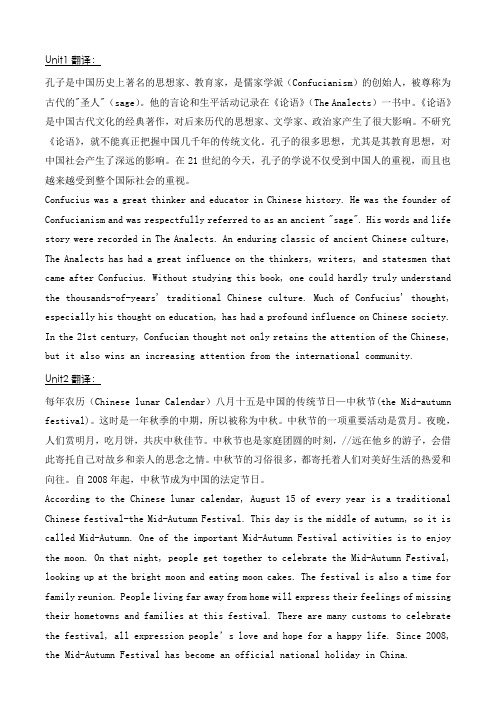
孔子是中国历史上著名的思想家、教育家,是儒家学派(Confucianism)的创始人,被尊称为古代的"圣人"(sage)。
他的言论和生平活动记录在《论语》(The Analects)一书中。
《论语》是中国古代文化的经典著作,对后来历代的思想家、文学家、政治家产生了很大影响。
不研究《论语》,就不能真正把握中国几千年的传统文化。
孔子的很多思想,尤其是其教育思想,对中国社会产生了深远的影响。
在21世纪的今天,孔子的学说不仅受到中国人的重视,而且也越来越受到整个国际社会的重视。
Confucius was a great thinker and educator in Chinese history. He was the founder of Confucianism and was respectfully referred to as an ancient "sage". His words and life story were recorded in The Analects. An enduring classic of ancient Chinese culture, The Analects has had a great influence on the thinkers, writers, and statesmen that came after Confucius. Without studying this book, one could hardly truly understand the thousands-of-years' traditional Chinese culture. Much of Confucius' thought, especially his thought on education, has had a profound influence on Chinese society. In the 21st century, Confucian thought not only retains the attention of the Chinese, but it also wins an increasing attention from the international community.Unit2翻译:每年农历(Chinese lunar Calendar)八月十五是中国的传统节日—中秋节(the Mid-autumn festival)。
新视野大学英语读写教程第三版1课文翻译
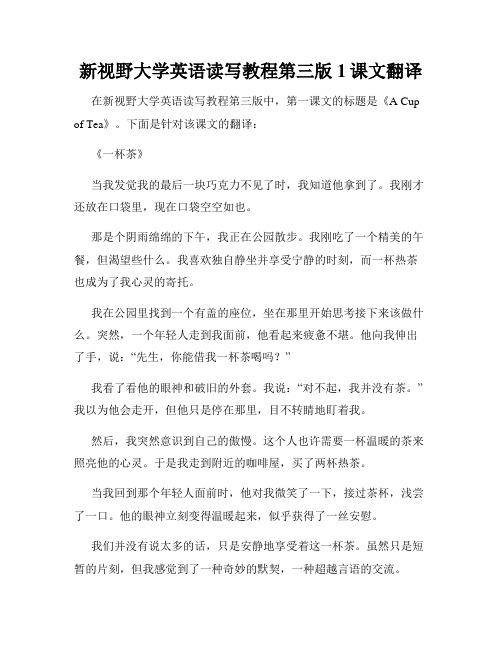
新视野大学英语读写教程第三版1课文翻译在新视野大学英语读写教程第三版中,第一课文的标题是《A Cup of Tea》。
下面是针对该课文的翻译:《一杯茶》当我发觉我的最后一块巧克力不见了时,我知道他拿到了。
我刚才还放在口袋里,现在口袋空空如也。
那是个阴雨绵绵的下午,我正在公园散步。
我刚吃了一个精美的午餐,但渴望些什么。
我喜欢独自静坐并享受宁静的时刻,而一杯热茶也成为了我心灵的寄托。
我在公园里找到一个有盖的座位,坐在那里开始思考接下来该做什么。
突然,一个年轻人走到我面前,他看起来疲惫不堪。
他向我伸出了手,说:“先生,你能借我一杯茶喝吗?”我看了看他的眼神和破旧的外套。
我说:“对不起,我并没有茶。
”我以为他会走开,但他只是停在那里,目不转睛地盯着我。
然后,我突然意识到自己的傲慢。
这个人也许需要一杯温暖的茶来照亮他的心灵。
于是我走到附近的咖啡屋,买了两杯热茶。
当我回到那个年轻人面前时,他对我微笑了一下,接过茶杯,浅尝了一口。
他的眼神立刻变得温暖起来,似乎获得了一丝安慰。
我们并没有说太多的话,只是安静地享受着这一杯茶。
虽然只是短暂的片刻,但我感觉到了一种奇妙的默契,一种超越言语的交流。
茶喝完后,那个年轻人向我鞠了一躬,微笑着离开了。
我看着他远去的背影,心里充满了满足和喜悦。
这一杯茶不仅温暖了他的心灵,也温暖了我的心灵,使我意识到每个人都需要关爱和温暖。
从那以后,我经常会在公园遇到各种各样的人。
有时,我会给他们一杯茶,有时,他们也会给我一杯茶。
这一杯茶成为了一种特殊的纽带,连接着一切。
我们都可以通过一杯茶来传递爱和关怀,使这个世界变得更加美好。
无论是接受茶,还是分享茶,我们都可以用这一杯简单的饮品来温暖彼此的心房。
茶,并不只是茶,它是一种情感的象征,一种无形的纽带,它能让我们彼此的距离更近,更加理解与关怀。
所以,让我们从现在开始,一起享受一杯茶,共同创造更美好的世界。
新视野大学英语1-4册课后翻译答案 (汉翻英 完整版)
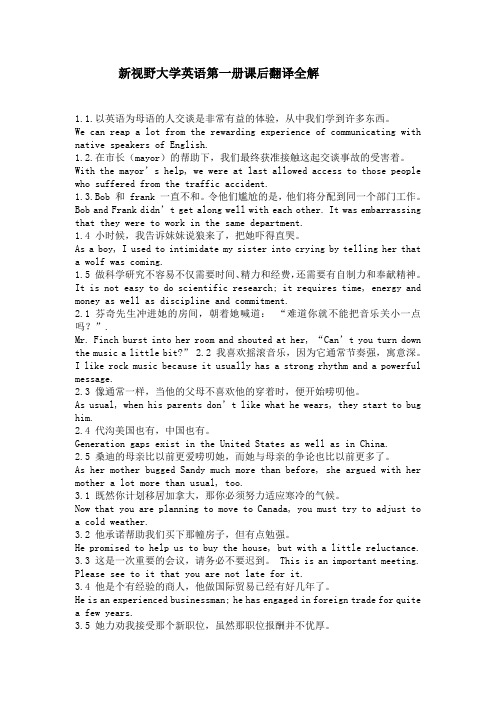
新视野大学英语第一册课后翻译全解1.1.以英语为母语的人交谈是非常有益的体验,从中我们学到许多东西。
We can reap a lot from the rewarding experience of communicating with native speakers of English.1.2.在市长(mayor)的帮助下,我们最终获准接触这起交谈事故的受害着。
With the mayor’s help, we were at last allowed access to those pe ople who suffered from the traffic accident.1.3.Bob 和 frank 一直不和。
令他们尴尬的是,他们将分配到同一个部门工作。
Bob and Frank didn’t get along well with each other. It was embarrassing that they were to work in the same department.1.4 小时候,我告诉妹妹说狼来了,把她吓得直哭。
As a boy, I used to intimidate my sister into crying by telling her thata wolf was coming.1.5 做科学研究不容易不仅需要时间、精力和经费,还需要有自制力和奉献精神。
It is not easy to do scientific research; it requires time, energy and money as well as discipline and commitment.2.1 芬奇先生冲进她的房间,朝着她喊道:“难道你就不能把音乐关小一点吗?”.Mr. Finch burst into her room and shouted at her, “Can’t you turn down the music a little bit?” 2.2 我喜欢摇滚音乐,因为它通常节奏强,寓意深。
新视野大学英语课后翻译(全4册)

新视野大学英语(专升本)课后翻译及答案新视野大学英语(专升本)课后翻译及答案1第一册2第二册4第三册6第四册8部分省份考试部分为原题第一册1.I don't like the way he teaches English(他教英语的方法)2.An old friend from another country, whom I was expecting to stay with(我希望和我住在一起的人)3.The watch which was lost in the department store yesterday(昨天在百货商店丢失的).4.I'll never forget the city where Mary and I spent our childhood(我和玛丽在那里度过的童年时光).5.He won a gold medal, which the whole family considered a great honor(全家人认为这是个了不起的荣誉).6. Despite his illness(他尽管有病),he came to the meeting.7. Despite a lot of difficulties(尽管有许多困难),he managed to finish the work within three weeks.8.He is learning to drive, despite his old age(尽管他年事已高).9. despite the bad weather(尽管天气很差),they decided to go climbing this weekend.10.He failed in the exam a third time despite his hard work(尽管他很努力).11. Even if the calculation is right(即使计算正确),scientists can never be sure that they have included all variables(变量).12.He is going to buy the factory, even if they raise the price(即使他们提价).13. Even if she may not return me the money(即使她可能不还钱),I don't regret lending it to her.14.The party will be held as scheduled, even if she doesn’t come(即使她不来).15._ Even if we achieve great success in our work(即使在工作中取得很大的成功),we should not be conceited.16.He had been forced to spend most of time talking to Mrs. Harlowe rather than to her daughter(而不是同他女儿交谈).17.Nuclear science should be developed to benefit people rather than harm them(而不是伤害他们).18.I always prefer starting early rather than leaving everything to the last minute(而不是把一切拖延到最后一分钟)19. Rather than using the last of my cash(不用我最后的一些现金),I decided to write a check.20. It's important to put money into new equipment rather than increase pay(而不是增加工资).21.The more books a man reads, the more knowledge he will have(他了解的知识就越丰富).22.The more he thought about it, the less he liked it他就越不喜欢它).23.The small the house is, the less you have to pay for it(他要付的钱就越少).24.The more dangerous a journey is, the more exciting it will be(就越令人兴奋).25.The more you talk in English, the greater progress you will make(取得的进步就越大).26. What I say and do(我说什么做什么)is/are none of your business.27.The Olympic Game uphold the idea that what matters is not winning but participating(重在参与,不在输赢).28.This is what we students should always keep in mind(我们学生应该牢记于心的).29.They don't realize what it takes to start and run a company(创建和经营一家公司需要什么).30.We must not put off till tomorrow_ what we should do today(应该今天做的事).第二册1.The student can hardly speak English much less can he write English articles (更不用说写英语文章了)2.He can not manage a small shop much less can he manage a big company (更不用说管理一家大公司了)3.John could not even pick up the box much less could he carry it upstairs (更不用说把它搬到楼上了)4.I have never seem the man much less have I spoken to him (更不用说跟他谈话了)5.Almost every scientist now finds it impossible to read all the works connected with his own subject much less to read a lot outside of it(更不用说阅读专业以外的了)6.I won't apologize to him for doing this nor do I think it necessary to do so (我也不觉得有这个必要)7.My parents said they wouldn't come to us for the Chinese New Years nor would they go to my sister's (也不回去我妹妹家)8.We have no idea about where the girl lives nor do we have her telephone number (我们也不知道她的电话号码)9.I don't feel like continuing my study after graduation nor would I like to go to work immediately (我也不想立即找工作)10.Father and I worked out this plan together, he wouldn't change it no matter what happened, nor would I (我也不会)11.Sandy promised to marry John as long as she got her father's agreement (只要她得到父母的同意)12.As long as you set a goal for yourself (只要你为自己定下目标),you will get somewhere someday.13.As long as she pays all the costs herself(只要他支付一切费用)she can go to visit her aunt in Los Angeles.14.The secretary will get a pay raise_ as long as she does her job well (只要她做好工作)15.as long as you never lose heart (只要你不泄气)no difficulty is too great to triumph over.16.As water is to fish_ So is air to human being (空气对人也一样)17.As the lion is the king of all animalsSo is the eagle of all birds(鹰也是鸟类之王)18.As wine is to French people So is the beer to the British (啤酒对于英国人也一样)19.Just as coffee is to westerners So is tea to the Chinese (茶对于中国人也一样)20.Just as the French love their wine So do the English love their beer(英国人一样喜欢自己的啤酒)21.Mike seemed very proud of himself as though he were the only person who scored over 90 (好像只有他的了90分以上)22.The old lady gave all that she had to the young man treating him as though he were her own son (好像他是她的亲生儿子)23.Tom dressed himself so formally today as though he were attending a party (好像他要去赴宴)24.He always boasts of his rich experience as though he knew everything (好像他什么都知道)第三册1.Every substance in the world, no matter how different it may seem form any other substance(不管看起来和其他物质多么不同), is made partly of electrons.2.No matter what a women tries to do to improve her situation(不管一个女人试图做什么来改变她的处境),there is some barrier to keep her down.3.No matter what excuse he gives(不管他给出什么借口), I will not forgive him for being so late for our appointment.4.No matter what anyone else may think(无论别人可能怎么想), only he can know whether he made the right choice.5.We have always been an independent people, no matter how they rewrite history(无论他们怎样改写历史).6.As it was quite windy outside, Jack closed all the windows and doors so that the baby would not catch cold.(这样宝宝就不会着凉了)7.The candidate toured in several cities in the state, giving speeches of his political viewpointsso that more people would vote for him(为的是更多的人会投他一票)8.Tom cleaned his father’s car and mowed the lawn by himself so that his father might forgive him for his failure in the math exam(这样他父亲也许会原谅他这次数学考试不及格)9.Mr. Johnson made full preparation for the experiment so that it would go on smoothly((以便实验能顺利地进行)10.I’ll give you all the facts so that you can judge for yourself(以使你自己作出判断)11.As to what actually happened to the headquarter(至于总部发生了什么事), there are many differing stores .12.As to where I should go to further my study(至于我去哪里继续深造). I will be discussing with my parents.13.It is totally unclear to me as to how different they are and why we want to keep them both(它们什么不同,我们为什么两个都要保留)14.It’s difficult for me to make a decision as to whether or not I should remain at the college working as teaching assistant (关于我是否应该留在学校当助教)15.The decision as to whether the old hardware is to be replaced by new hardware(关于旧的硬件是否将被新的硬件所代替)remains to be made16.You seem to be quite certain that I will accept your offer, what if I say no(如果我说不接受呢)17.If they know we are in trouble , they will certainly come to our help, what if they do not know(如果他们不知道呢)18.The deadline for this job is the end of the month , what if we can not finish it on time(要是我们不能按时完成怎么办)19.When asked why they helped the flood victims so generously, they just answered: what if this happens to us someday(假如有一天这事发生在你我身上呢)第四册1.We never go to church other than for funerals and weddings (除了去参加葬礼和婚礼之外).2.I have no ambitions other than to live an independent life (除了过一种独立生活之外).3.He insists the designs have no great meaning, other than that they appealed to his eye (除了它们很吸引他的眼球之外).4.He doesn’t eat pork, but other than that, he'll eat just about everything (但除此之外,他什么都吃).5.With all this work on hand, he shouldn't have been to the cinema last night(昨晚不应该去看电影).6.I would have told him the answer(会告诉他答案)had it been possible, but I was so busy then.7.They hurried there only to find the meeting canceled. In fact, they needn't have gone at all (他们根本不需要去)8.If Henry did not attend the conference last night, he must have had too much work to do (一定是有很多工作要做)9.Philip might have been injured seriously (可能受了重伤)in the car accident.10.With so much going on at the office, it is a wonder to find (令人惊奇地发现)that Mr. Lawrence has much time left for anything else.11.It is a surprise for us to find(我们非常吃惊地发现)that television enjoys its greatest competitive advantage on information.12.You’ll soon find that it is a waste of time to argue with him (与他争论是浪费时间).13.It is a relief for us to learn(我们宽慰的了解到)that the driver was able to control the car during the stormy weather.14.Prices are going up so rapidly. Petrol now is twice as expensive as it was a few years ago(现在汽油价格已经十几年前的两倍).15.Have you visited their house? Theirs is about three times as big as ours. (他们的屋子大约是我们的三倍大小).16.My father always gets information form the local library. You might as well go there to see whether there is the information you need.你不妨去那儿看看有没有你需要的资料)17.While you live alone, you can do as you like. We might as well call it freedom (我们不妨称之为自由吧).18.They miss you very much. You might as well ring and tell them you're going to visit them. (你不妨打电话告诉他们你要去看望他们)19.It’s no good waiting for the bus. We might as well walk home. (我们不妨走回家吧)20.This passage is too difficult for us to read. We might as well find an easier one to read (我们不妨找一篇容易一些的读吧)。
新视野大学英语第一册Unit 1课文翻译

新视野大学英语第一册Unit 1课文翻译新视野大学英语第一册Unit 1课文翻译学习外语是我一生中最艰苦也是最有意义的经历之一。
虽然时常遭遇挫折,但却非常有价值。
我学外语的经历始于初中的第一堂英语课。
老师很慈祥耐心,时常表扬学生。
由于这种积极的教学方法,我踊跃回答各种问题,从不怕答错。
两年中,我的成绩一直名列前茅。
到了高中后,我渴望继续学习英语。
然而,高中时的经历与以前大不相同。
以前,老师对所有的学生都很耐心,而新老师则总是惩罚答错的学生。
每当有谁回答错了,她就会用长教鞭指着我们,上下挥舞大喊:“错!错!错!”没有多久,我便不再渴望回答问题了。
我不仅失去了回答问题的乐趣,而且根本就不想再用英语说半个字。
好在这种情况没持续多久。
到了大学,我了解到所有学生必须上英语课。
与高中老师不同,大学英语老师非常耐心和蔼,而且从来不带教鞭!2. 能通过书写进行交流。
虚拟课堂的交流几乎都是书面形式。
因而很重要的一点是学生要具有书面表达能力。
有些学生书面表达能力差,有待提高,可以在网上学习之前提高或将其作为网上学习的一部分。
这常常需要他们加倍努力。
不管是单独学习还是小组学习,学生们就学习内容交流观点和见解,并展开讨论,同时了解其他同学的意见。
这样,学生可以从同龄人那里得到启发,既跟老师学,又互相学习。
3. 说出你的困难。
记住,虚拟课堂里老师看不见学生。
这就意味学生必须直接明了地表达自己的看法和要求。
如果碰到技术方面的问题,或在理解课程中遇到困难,必须大胆说出来,否则任何人都无从知晓问题所在。
如果某人不理解某个问题,或许别人也有同样的问题。
如果有哪个学生能解决,他(她)也许就会帮助你。
学生在给他人解释问题时,自己对该问题的认识也加深了。
4. 认真对待课程。
网上学习并不比课堂学习容易。
事实上,许多学生说它需要花更多的时间和努力。
网络课程的要求不低于其他任何一种优质课程。
然而,取得成功的学生认为网上学习是一种便捷的受教育方式,但并不容易。
新视野大学英语第一册Unit1 Learning a Foreign Language课文翻译及课后答案
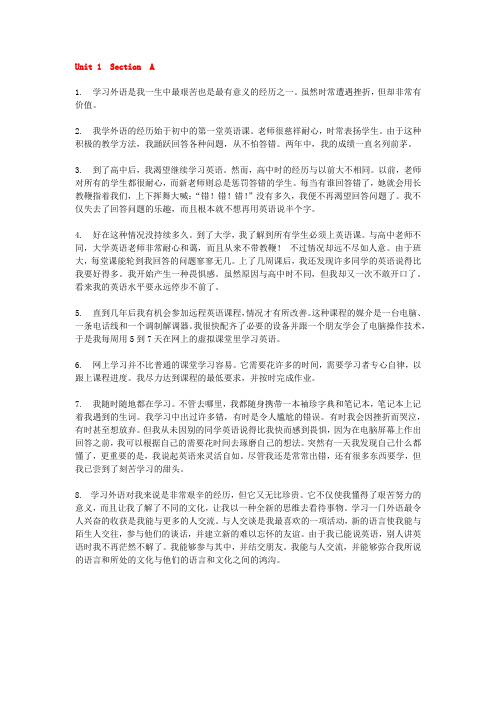
Unit 1 Section A1. 学习外语是我一生中最艰苦也是最有意义的经历之一。
虽然时常遭遇挫折,但却非常有价值。
2. 我学外语的经历始于初中的第一堂英语课。
老师很慈祥耐心,时常表扬学生。
由于这种积极的教学方法,我踊跃回答各种问题,从不怕答错。
两年中,我的成绩一直名列前茅。
3. 到了高中后,我渴望继续学习英语。
然而,高中时的经历与以前大不相同。
以前,老师对所有的学生都很耐心,而新老师则总是惩罚答错的学生。
每当有谁回答错了,她就会用长教鞭指着我们,上下挥舞大喊:“错!错!错!”没有多久,我便不再渴望回答问题了。
我不仅失去了回答问题的乐趣,而且根本就不想再用英语说半个字。
4. 好在这种情况没持续多久。
到了大学,我了解到所有学生必须上英语课。
与高中老师不同,大学英语老师非常耐心和蔼,而且从来不带教鞭!不过情况却远不尽如人意。
由于班大,每堂课能轮到我回答的问题寥寥无几。
上了几周课后,我还发现许多同学的英语说得比我要好得多。
我开始产生一种畏惧感。
虽然原因与高中时不同,但我却又一次不敢开口了。
看来我的英语水平要永远停步不前了。
5. 直到几年后我有机会参加远程英语课程,情况才有所改善。
这种课程的媒介是一台电脑、一条电话线和一个调制解调器。
我很快配齐了必要的设备并跟一个朋友学会了电脑操作技术,于是我每周用5到7天在网上的虚拟课堂里学习英语。
6. 网上学习并不比普通的课堂学习容易。
它需要花许多的时间,需要学习者专心自律,以跟上课程进度。
我尽力达到课程的最低要求,并按时完成作业。
7. 我随时随地都在学习。
不管去哪里,我都随身携带一本袖珍字典和笔记本,笔记本上记着我遇到的生词。
我学习中出过许多错,有时是令人尴尬的错误。
有时我会因挫折而哭泣,有时甚至想放弃。
但我从未因别的同学英语说得比我快而感到畏惧,因为在电脑屏幕上作出回答之前,我可以根据自己的需要花时间去琢磨自己的想法。
突然有一天我发现自己什么都懂了,更重要的是,我说起英语来灵活自如。
新视野大学英语(第三版)读写教程第一册课文翻译(全册)
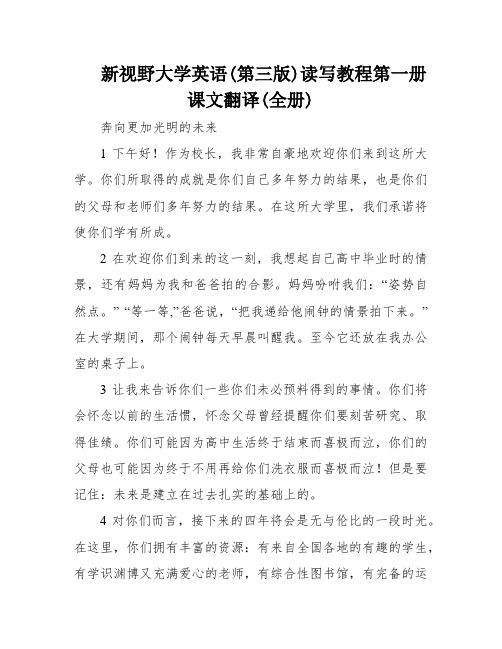
新视野大学英语(第三版)读写教程第一册课文翻译(全册)奔向更加光明的未来1下午好!作为校长,我非常自豪地欢迎你们来到这所大学。
你们所取得的成就是你们自己多年努力的结果,也是你们的父母和老师们多年努力的结果。
在这所大学里,我们承诺将使你们学有所成。
2在欢迎你们到来的这一刻,我想起自己高中毕业时的情景,还有妈妈为我和爸爸拍的合影。
妈妈吩咐我们:“姿势自然点。
” “等一等,”爸爸说,“把我递给他闹钟的情景拍下来。
” 在大学期间,那个闹钟每天早晨叫醒我。
至今它还放在我办公室的桌子上。
3让我来告诉你们一些你们未必预料得到的事情。
你们将会怀念以前的生活惯,怀念父母曾经提醒你们要刻苦研究、取得佳绩。
你们可能因为高中生活终于结束而喜极而泣,你们的父母也可能因为终于不用再给你们洗衣服而喜极而泣!但是要记住:未来是建立在过去扎实的基础上的。
4对你们而言,接下来的四年将会是无与伦比的一段时光。
在这里,你们拥有丰富的资源:有来自全国各地的有趣的学生,有学识渊博又充满爱心的老师,有综合性图书馆,有完备的运动设施,还有针对不同兴趣的学生社团——从文科社团到理科社团、到社区服务等等。
你们将自由地探索、研究新科目。
你们要学着惯点灯熬油,学着结交充满魅力的人,学着去追求新的爱好。
我想鼓励你们充分利用这一特殊的经历,并用你们的干劲和热情去收获这一机会所带来的丰硕成果。
5有这么多课程可供选择,你可能会不知所措。
你不可能选修所有的课程,可是要尽可能体验更多的课程!大学里有良多事情可做可学,每件事情都会为你供给不同视角来审视世界。
如果我只能给你们一条选课建议的话,那就是:挑战自己!不要以为你早就了解自己对什么样的领域最感兴趣。
选择一些你从未接触过的领域的课程。
这样,你不仅会变得更加博学,而且更有可能发现一个你未曾想到的、能成就你未来的爱好。
一个绝佳的例子就是时装设计师XXX,她最初学的是艺术史。
跟着工夫的推移,XXX把艺术史研究和对时装的热爱结合起来,并将其转化为对设计的热情,从而使她成为全球著名的设计师。
新视野大学英语第一册课后翻译

汉译英1.对于网络课程,学生不仅可以选择何时何地的学习,在回答问题之前他们还可以有时间思考答案。
Not only can students choose when and where to learn for an online course, but they can also take time to think through answers before making a reply.2.网上学习的想法使她非常的兴奋,而他认为网上学习毫无意义和用处。
She is excited by the idea of online learning while be considers it meaningless and useless.3.与以英语为母语的人交谈是非常有益的体验,从中我们能学到许多东西。
Communicating with native English speakers is a very rewarding experience from which we can learn a lot.4. 如今,越来越多的人可以利用互联网查找他们的信息。
Today, more and more people have access to the Internet through which they look for the information they need.5.他要她放弃工作在家照顾孩子,但是她觉得这个要求太过分了。
He wants her to give up working and stay home to look after the children. She feels, however, that this is too much for her.6.既然我们已经学完这门课程,就应该多做些复习。
Now that we have finished the course, we shall start doing more revision work.1. 当她就要关掉音乐时,她父亲冲进她的房间,朝着她喊道:“难道你就不能把音乐关小一点?”As she was about to turn off the music, her father burst into he room and shouted a t her, “Can’t you turn down the music a little bit?”2. 酒吧是老板一直在看那个姑娘跳舞,一面却假装没有看。
新视野大学英语1课后翻译
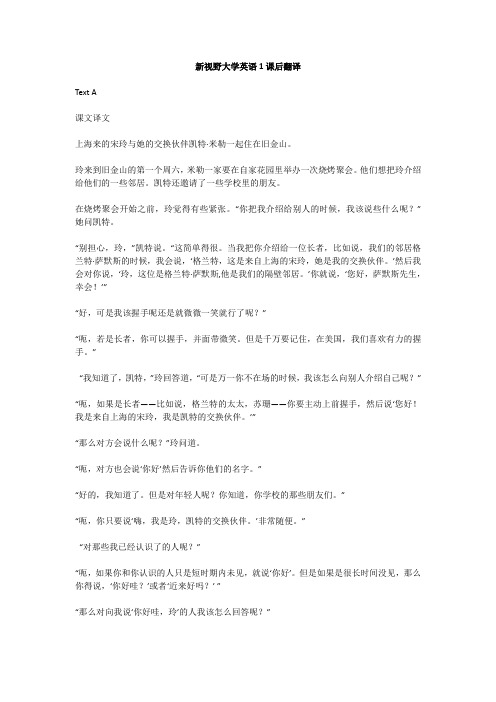
新视野大学英语1课后翻译Text A课文译文上海来的宋玲与她的交换伙伴凯特·米勒一起住在旧金山。
玲来到旧金山的第一个周六,米勒一家要在自家花园里举办一次烧烤聚会。
他们想把玲介绍给他们的一些邻居。
凯特还邀请了一些学校里的朋友。
在烧烤聚会开始之前,玲觉得有些紧张。
“你把我介绍给别人的时候,我该说些什么呢?”她问凯特。
“别担心,玲,”凯特说。
“这简单得很。
当我把你介绍给一位长者,比如说,我们的邻居格兰特·萨默斯的时候,我会说,‘格兰特,这是来自上海的宋玲,她是我的交换伙伴。
’然后我会对你说,‘玲,这位是格兰特·萨默斯,他是我们的隔壁邻居。
’你就说,‘您好,萨默斯先生,幸会!’”“好,可是我该握手呢还是就微微一笑就行了呢?”“呃,若是长者,你可以握手,并面带微笑。
但是千万要记住,在美国,我们喜欢有力的握手。
”“我知道了,凯特,”玲回答道,“可是万一你不在场的时候,我该怎么向别人介绍自己呢?”“呃,如果是长者——比如说,格兰特的太太,苏珊——你要主动上前握手,然后说‘您好!我是来自上海的宋玲,我是凯特的交换伙伴。
’”“那么对方会说什么呢?”玲问道。
“呃,对方也会说‘你好’然后告诉你他们的名字。
”“好的,我知道了。
但是对年轻人呢?你知道,你学校的那些朋友们。
”“呃,你只要说‘嗨,我是玲,凯特的交换伙伴。
’非常随便。
”“对那些我已经认识了的人呢?”“呃,如果你和你认识的人只是短时期内未见,就说‘你好’。
但是如果是很长时间没见,那么你得说,‘你好哇?’或者‘近来好吗?’ ”“那么对向我说‘你好哇,玲’的人我该怎么回答呢?”“就说‘我很好,谢谢,你怎么样啊?’然后对方会说,‘我也很好,谢谢。
’”“好吧。
但我想起你之前说过这很简单的。
”Text B课文译文詹妮弗与大卫是在一家交友网站上结识的,他们上周第一次见面。
读读看他们的讲述:大卫的讲述詹妮弗是我见过的最漂亮的姑娘。
我猜她一定是个时装模特。
新视野大学英语课文翻译(双面,一页一面)

Unit 1 Text A 一堂难忘的英语课1 如果我是唯一一个还在纠正小孩英语的家长,那么我儿子也许是对的。
对他而言,我是一个乏味的怪物:一个他不得不听其教诲的父亲,一个还沉湎于语法规则的人,对此我儿子似乎颇为反感。
2 我觉得我是在最近偶遇我以前的一位学生时,才开始对这个问题认真起来的。
这个学生刚从欧洲旅游回来。
我满怀着诚挚期待问她:“欧洲之行如何?”3 她点了三四下头,绞尽脑汁,苦苦寻找恰当的词语,然后惊呼:“真是,哇!”4 没了。
所有希腊文明和罗马建筑的辉煌居然囊括于一个浓缩的、不完整的语句之中!我的学生以“哇!”来表示她的惊叹,我只能以摇头表达比之更强烈的忧虑。
5 关于正确使用英语能力下降的问题,有许多不同的故事。
学生的确本应该能够区分诸如their/there/they're之间的不同,或区别plimentary 跟plementary之间显而易见的差异。
由于这些知识缺陷,他们承受着大部分不该承受的批评和指责,因为舆论认为他们应该学得更好。
6 学生并不笨,他们只是被周围所看到和听到的语言误导了。
举例来说,杂货店的指示牌会把他们引向stationary(静止处),虽然便笺本、相册、和笔记本等真正的stationery(文具用品)并没有被钉在那儿。
朋友和亲人常宣称They've just ate。
实际上,他们应该说They've just eaten。
因此,批评学生不合乎情理。
7 对这种缺乏语言功底而引起的负面指责应归咎于我们的学校。
学校应对英语熟练程度制定出更高的标准。
可相反,学校只教零星的语法,高级词汇更是少之又少。
还有就是,学校的年轻教师显然缺乏这些重要的语言结构方面的知识,因为他们过去也没接触过。
学校有责任教会年轻人进行有效的语言沟通,可他们并没把语言的基本框架——准确的语法和恰当的词汇——充分地传授给学生。
8 因为语法对大多数年轻学生而言枯燥且乏味,所以我觉得讲授语法得一步一步、注重技巧地进行。
新视野大学英语1读写教程课后完形翻译

(1)I, for one, am far from ready to use online courses for my learning. Don’t get me wrong I am very happy about all the communication and learning opportunities the courses have give us. But for me those opportunities should not be used to replace classroom activities. In other words, they are only tools to help me learn what has already been offered in the classroom. (1)我是一个远离准备使用在线课程的学习。
别误会我,我很高兴所有的交流和学习的机会给我们的课程。
但对我来说这些机会不应该用来取代课堂活动。
换句话说,他们是唯一的工具来帮助我学习已经提供了在教室里。
I love the classroom. I love having classmates. There are forty students in my class right now, and I think it’s great. I even love having classmates who are better than me. And, Let’s not forget the smell of ink on paper, the sound of chalk on a blackboard, the hardness of a wooden bench or heat inside the classroom in early September. I love it all. But most of all, I love having a teacher—a ―real live‖ teacher. I get excited when I am in the classroom with a good teacher. I learn in a way that has been proven to work. I am given insight not only into a certain subject, but also into the world. 我爱教室。
- 1、下载文档前请自行甄别文档内容的完整性,平台不提供额外的编辑、内容补充、找答案等附加服务。
- 2、"仅部分预览"的文档,不可在线预览部分如存在完整性等问题,可反馈申请退款(可完整预览的文档不适用该条件!)。
- 3、如文档侵犯您的权益,请联系客服反馈,我们会尽快为您处理(人工客服工作时间:9:00-18:30)。
Unit 1苏格拉底是古希腊哲学家,被誉为现代西方哲学的奠基人。
他是一个谜一般的人物,人们主要通过后期的一些古典作家的叙述,尤其是他最著名的学生柏拉图的作品去了解他。
苏格拉底以他对伦理学的贡献而闻名。
他的教学法亦称为苏格拉底法,即通过提问和回答来激发批判性思维以及阐述观点。
该方法在各种讨论中仍被普遍使用。
他还在认识论和逻辑领域作出了重大而深远的贡献。
他的思想和方法所带来的影响一直是后来的西方哲学的坚实基础。
苏格拉底是古代哲学史上最丰富多彩的人物。
他在他那个时代已威名远扬。
虽然他未曾建立什么哲学体系,未曾设立什么学派,也未曾创立什么宗派,但他的名字很快就变得家喻户晓了。
孔子是中国历史上著名的思想家、教育家,是儒家学派(Confucianism)的创始人,被尊称为古代的圣人(sage)。
他的言论和生平活动记录在《论语》(The Analects)一书中。
《论语》是中国古代文化的经典著作,对后来历代的思想家、文学家、政治家产生了很大影响。
不研究《论语》,就不能真正把握中国几千年的传统文化。
孔子的很多思想,尤其是其教育思想,对中国社会产生了深远的影响。
在21世纪的今天,孔子的学说不仅受到中国人的重视,而且也越来越受到整个国际社会的重视。
Unit 2圣诞节是一个被广泛庆祝的文化节日,全世界有许许多多的人在12月25日庆祝这一节日。
它是为了纪念耶稣基督的诞辰。
该节日最早可追溯到公元3 3 6年。
渐渐地,这一节日演变为一个既是宗教又是非宗教的节日,越来越多的非基督徒也庆祝圣诞节。
如今,圣诞节在全球被作为一个重大的节日和公共假日来庆祝。
不同国家的圣诞节风俗也各不相同。
现代流行的圣诞节风俗包括交换圣诞贺卡和圣诞礼物、唱圣诞歌曲、参加教堂活动、摆放各种圣诞装饰品和圣诞树、举行家庭聚会以及准备一顿特别的大餐。
对小孩子们来说,这个节日充满了幻想和惊喜。
据传说,圣诞老人会在圣诞夜从烟囱进入每户人家,给乖巧听话的孩子带来礼物。
由于圣诞节送礼物以及许多其他方面推动了基督徒和非基督徒的经济活动,圣诞节也因此成为商家的一个重大活动和主要销售季。
每年农历(Chinese lunar calendar)八月十五是我国的传统节日——中秋节(the Mid-Autumn Festival)。
这时是一年秋季的中期,所以被称为中秋。
中秋节的一项重要活动是赏月。
夜晚,人们赏明月、吃月饼,共庆中秋佳节。
中秋节也是家庭团圆的时刻,远在他乡的游子,会借此寄托自己对故乡和亲人的思念之情。
中秋节的习俗很多,都寄托着人们对美好生活的热爱和向往。
自2008年起,中秋节成为中国的法定节假日。
Unit 3伦敦地铁是英国的一个快速交通运输系统,服务于大伦敦的大部分地区。
地铁系统因其地铁隧道的典型形状也被称为地下管道。
伦敦地铁始建于19世纪中期,是世界上最早的地下铁路系统。
它的第一段地铁于1863年开始运营。
自此,伦敦地铁不断延伸,发展成为一个包括12条线路、275个车站、铁轨总长超过250英里的地铁杰作,其中有45个在地下运行。
就路线长度而言,它是世界上第四大地铁系统,也是车站数量最多的地铁系统之一。
作为一个走遍伦敦的经济便捷的途径,伦敦地铁一向是每天数百万通勤者以及在节假日游历伦敦的游客的首选。
伦敦地铁已成为伦敦的一个国际标志。
2013年伦敦举办了各种各样的活动,庆祝地铁运营150周年,纪念这一里程碑。
中国航天业开创于1956年。
几十年来,中国航天事业创造了一个又一个奇迹。
1970年,中国成功发射了第一颗人造地球卫星,成为世界上第五个独立自主研制和发射人造地球卫星的国家。
1992年,中国开始实施载人航天飞行工程(manned spaceflight program)。
2003年,中国成功发射了神舟五号载人飞船,使中国成为第三个发射载人飞船的国家。
2007年发射了嫦娥一号,即第一颗绕月球飞行(lunar-orbiting)的人造卫星。
2013年,第五艘载人飞船神舟十号发射成功,为中国空间站的建设打下了基础。
Unit 4作为通过中国游历亚洲的首批欧洲人之一,马可?波罗可能是中国人最熟知的外国商人和航海家。
从1271年到1295年,他和他的家人游历广泛,遍及欧洲和亚洲。
期间,他在中国留居了17年。
他的著作《马可?波罗游记》描述了他游历亚洲的旅程,让欧洲人首次全面领略了包括中国、印度和日本在内的远东地区的情况。
从他的文字叙述中,西方人第一次了解到瓷器、煤炭、火药、印刷术、纸币以及丝绸。
在15世纪末和16世纪欧洲发现与征服的大航海时代,马可波罗所记录的大量新的地理信息得到了广泛使用。
在他去世后的这几个世纪里,马可波罗获得了他在有生之年未曾获得的赞誉。
马可波罗的故事鼓舞了其他无数的探险者去踏上征程,发现世界。
郑和是中国历史上最著名的航海家(maritime explorer)。
公元1405年,明朝的统治者为了稳固边防(border defense)和开展海上贸易,派郑和下西洋(the Western Seas)。
在此后的28年里,郑和带领船队七下西洋,前后出海的人员有10多万人,访问了30多个国家和地区。
船队纵横南亚、西亚,一直到非洲大陆。
郑和下西洋是世界航海(navigation)史上的壮举,它展现了郑和卓越的航海和组织才能,同时展现了明朝的国力和国威(national strength and prestige),加强了明朝和海外各国之间的关系。
Unit 5有关古代奥林匹克运动会的最早文字记载可追溯至公元前776年。
古代奥运会每4年举办一次,在8月6日与9月19日之间的一个纪念宙斯的宗教节日期间举行。
第一届现代奥运会于1896年在希腊雅典举办。
奥运会的标志由五个大小相同的套环组成,代表着五大洲的联合和来自世界各地运动员的大聚会。
奥运会真正腾飞、成为一项国际体育盛会是在1924年之后,即第8届奥运会在巴黎举办之后。
这一年,来自44个国家约3,000名运动员同场竞技,并且第一次在奥运会上增加了闭幕式这一仪式。
同年,冬季奥运会首次亮相,比赛项目包括花样滑冰、冰球、雪橇和冬季两项运动。
80年后,2004年夏季奥运会在相隔一个多世纪后再次在雅典举办,来自201个国家的近11,000名运动员展开竞技,创下参赛国数量之最。
太极拳(Tai Chi)是一种武术(martial arts)项目,也是一种健身运动,在中国有着悠久的历史。
太极拳动作缓慢而柔和,适合任何年龄、性别、体型的人练习。
太极拳既可防身,又能强身健体,因而深受中国人的喜爱。
太极拳在发展的过程中,借鉴并吸收了中国传统哲学、医术、武术的合理内容(element),成为特色鲜明的一项运动。
作为中国特有的一种运动形式,太极拳也越来越受到众多外国朋友的喜爱。
Unit 6间隔年指的是学生休假不去上学而去旅游或工作等的一段时间,但不一定是一年。
间隔年通常选在高中毕业和进入大学之前的一段时间。
在这段时间里,学生可以旅游、参加志愿者工作或者在国外边打工边度假。
一种新潮流是参加集语言学习、住家、文化交流、社区服务和自主学习于一体的国际教育活动。
间隔年的做法于20世纪60年代兴起于英国。
它在英国、澳大利亚、新西兰和加拿大已经变得非常流行。
但是在美国,间隔年的做法仍然只是个别现象。
不过近年来,间隔年对美国人来说变得稍微普遍起来。
2013年有大约四万美国学生参加了间隔年活动,比2006年增加了近20%。
普林斯顿大学、哈佛大学、麻省理工学院等大学都有明文规定允许学生延迟入学。
改革开放以来,中国的教育事业得到了快速发展,取得了引人瞩目的成就。
中国政府把教育摆在优先发展的地位,坚持科教兴国(revitalize the country),全面提倡素质教育(quality-oriented education)。
同时,积极推进教育公平,保障人人有受教育的机会。
中国的教育成就反映在两个不同的层面:一个是全面普及了九年义务教育(nine-year compulsory education),另一个是实现了高等教育大众化(mass higher education)。
教育的发展为中国的经济发展和社会进步作出了重大贡献。
近年来,为适应社会、经济发展的需要,中国政府不断加快培养各领域的急需人才。
Unit 7在所有美国人的信念中,最基本、最强烈的信念可能就是崇尚个人自由。
要理解美国人,最重要的也许就是了解他们对个人主义的热爱。
生活中他们很早就开始受到教育,把自己看成独立的个体,对人生中自己的处境以及自己的前途命运负责。
美国人认为自己的思想和行为高度个性化。
他们不愿被视为任何同质群体的代表。
如果确实加入了群体,他们也认为自己有特别之处,与同一个群体中的其他成员有着些许的差别。
与美国人对个人主义赋予的价值紧密相关的是他们对个人隐私的重视。
美国人认为,人需要有自己的时间或者有时间独处,用来思考事情,或者恢复他们所消耗的心理能量。
美国人很难理解那些总想与人结伴、不爱独处的外国人。
为人诚信,以和为贵是中华民族的传统美德。
和的思想体现在很多方面。
在处理人与人的关系上,中国传统思想主张和为贵以及家和万事兴,从而创造一个和谐的社会环境。
在人与自然的关系上,人类应当学会认识自然,尊重自然,保护自然。
人与人、人与社会、人与自然都需要和谐。
如今,和谐发展依然是我们的治国之本和管理人才之道。
随着我国社会经济和文化的发展,和的思想更加深入人心。
中国正在向构建社会主义和谐社会的目标迈进。
Unit 8作为世界上唯一一个真正具有普遍性的世界组织,联合国已经成为处理超越国界、而且任何一个国家都无法独立解决的问题的首要论坛。
联合国最初的宗旨是维护和平、保护人权、建立国际公平正义的框架以及促进经济和社会进步。
近年来,联合国又面临着新的挑战,诸如气候变化、国际恐怖主义和艾滋病等。
现在,解决争端及维护和平仍然是联合国最主要的任务。
除此之外,联合国及其专门机构还致力于各种旨在改进世界人民生活的活动,从赈灾到教育和妇女进步,再到原子能的和平使用。
联合国及其专门机构推动世界成为一个更加友好、更加宜居的地方,为全世界人民带来了福祉。
新中国成立后,中国坚持(persist in)独立自主的和平外交政策,在外交领域取得了巨大成就。
截至2011年,中国已与172个国家建立了外交关系(diplomatic relations)。
近年来,随着中国综合国力的提升(enhancement),中国在国际事务中的作用越来越重要,中国的国际地位得到进一步提升。
在地区性事务中,中国积极推动各种区域合作,为维护地区和平、促进地区发展作出了重要贡献。
中国外交(diplomacy)将高举和平、发展、合作、共赢的旗帜(banner),在和平共处五项原则的基础上,通过全面发展同各国的友好合作,为建设持久和平、共同繁荣的和谐世界作出不懈的努力(make unremitting efforts)。
